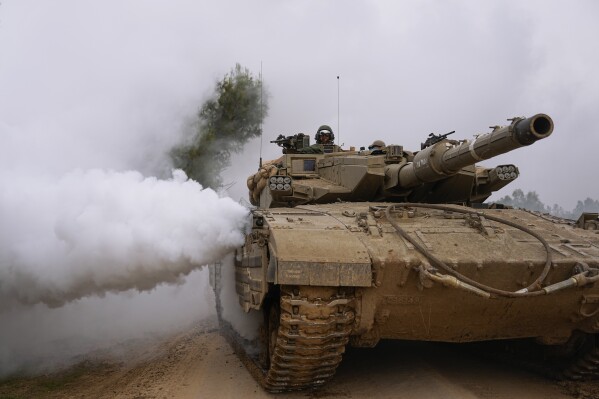A series of Israeli strikes early Monday hit Rafah, the city on the southern edge of the Gaza Strip where 1.4 million Palestinians have fled to escape fighting elsewhere in the four-month Israel-Hamas war.
Israel has been signaling its ground offensive in Gaza may soon target the densely populated city on the Egyptian border. On Sunday, the White House said President Joe Biden had warned Prime Minister Benjamin Netanyahu that Israel should not conduct a military operation against Hamas in Rafah without a “credible and executable” plan to protect civilians.
The strikes hit around Kuwait Hospital early Monday morning, an Associated Press journalist in Rafah said. Some of those wounded in the strikes had been brought to the hospital.
The Israeli military said it struck “terror targets in the area of Shaboura” — which is a district in Rafah. The military statement said the series of strikes had concluded, without elaborating on the targets or assessing the potential damage or casualties.
Palestinian health officials did not immediately offer any casualty information.
Biden’s remarks were his most forceful language yet on the possible operation. Biden, who last week called Israel’s military response in Gaza “over the top,” also sought “urgent and specific” steps to strengy then humanitarian aid. Israel’s Channel 13 television said the conversation lasted 45 minutes.
Discussion of the potential for a cease-fire agreement took up much of the call, a senior U.S. administration official said, and after weeks of diplomacy, a “framework” is now “pretty much” in place for a deal that could see the release of remaining hostages held by Hamas in exchange for a halt to fighting.
Over half of Gaza’s population of 2.3 million have fled to Rafah to escape fighting in other areas, and they are packed into tent camps and U.N.-run shelters. Egypt fears a mass influx of Palestinian refugees who may never be allowed to return.
Netanyahu told “Fox News Sunday” that there’s “plenty of room north of Rafah for them to go to” after Israel’s offensive elsewhere in Gaza, and said Israel would direct evacuees with “flyers, with cellphones and with safe corridors and other things.” But the offensive has caused widespread destruction, with little capacity to take in people.
The standoff between Israel and Egypt, two close U.S. allies, took shape as aid groups warned that an offensive in Rafah would worsen the catastrophic humanitarian situation in Gaza. Around 80% of residents have fled their homes, and the U.N. says a quarter of the population faces starvation.
A ground operation in Rafah could cut off one of the only avenues for delivering food and medical supplies. Forty-four trucks of aid entered Gaza on Sunday, said Wael Abu Omar, a spokesman for the Palestinian Crossings Authority. About 500 entered daily before the war.
Discussion of the potential for a cease-fire agreement took up much of the call, a senior U.S. administration official said, and after weeks of diplomacy, a “framework” is now “pretty much” in place for a deal that could see the release of remaining hostages held by Hamas in exchange for a halt to fighting.
The official, who spoke on condition of anonymity to discuss negotiations, acknowledged that “gaps remain,” but declined to give details. The official said military pressure on Hamas in the southern city of Khan Younis in recent weeks helped bring the group closer to accepting a deal.
Netanyahu’s office declined to comment on the call. Hamas’ Al-Aqsa television station earlier quoted an unnamed Hamas official as saying any invasion of Rafah would “blow up” the talks mediated by the United States, Egypt and Qatar.
Biden and Netanyahu spoke after two Egyptian officials and a Western diplomat said Egypt threatened to suspend its peace treaty with Israel if troops are sent into Rafah, where Egypt fears fighting could push Palestinians into the Sinai Peninsula and force the closure of Gaza’s main aid supply route.


